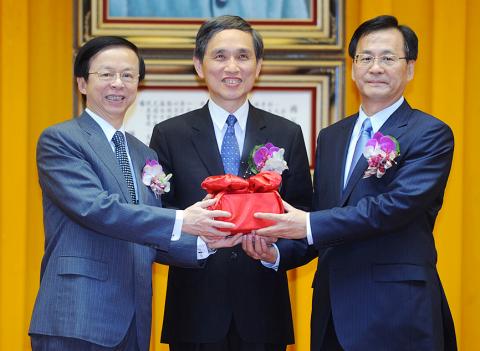Vice Minister of Economic Affairs Hwang Jung-chiou (黃重球) said a priority for Taiwan Power Co (Taipower, 台電) is to renegotiate the terms of contracts with independent power providers after he formally became the state-run utility’s chairman yesterday.
During a handover ceremony, he vowed to reverse the public’s negative sentiment toward the company, but declined to comment on a probe by the Agency Against Corruption on the company’s construction of the Fourth Nuclear Power Plant in Gongliao District (貢寮), New Taipei City (新北市).
The agency yesterday raided the power plant’s construction division and questioned five Taipower officials over the project’s procurements.

Photo: Liao Chen-huei, Taipei Times
Hwang replaced Edward Chen (陳貴明), who resigned on May 5 after six years on the job following widespread complaints of inefficiency and waste at the company.
The complaints were sparked by the company’s planned increased to electricity rates — which will be gradually introduced in three phases beginning on June 10 — as Taipower aims to cut its heavy losses.
“Taking the post of Taipower chairman is not an easy job at this time, but I will face the challenge and turn the crisis into an advantage,” Hwang said.
Taipower, the nation’s largest electricity supplier and monopoly grid operator, incurred net losses of NT$36 billion (US$1.2 billion) in 2010, a 167 percent increase from NT$13 billion in 2009, according to statistics posted on the company’s Web site. The company has accumulated NT$150 billion in net losses as of the end of last month.
Minister of Economic Affairs Shih Yen-shiang (施顏祥), who presided over the ceremony, said Taipower began losing money in 2006 because of rising international oil prices. While the company increased rates in 2006 and 2007, the increases were not enough, he added.
Hwang said Taipower had been under fire because of public misunderstanding of the utility’s operations, but acknowledged that there is room for improvement.
To improve the public’s perception of the company, Hwang said he would ensure full disclosure of information, effective communication with the public and flawless management.
In addition, the company would strictly follow measures proposed by a Ministry of Economic Affairs-organized task force to improve its to overall efficiency, he said. The task force is expected to deliver a report next month.
Hwang said he would also focus on transparency of electricity rates, procurement and fuel costs, and boost the company’s communication with the public, despite the complexities involving power generation and supply.
“I will make the company watch everything it spends, like a household does,” Hwang said, adding that he would enhance employees’ participation in the operations of the utility.

Sweeping policy changes under US Secretary of Health and Human Services Robert F. Kennedy Jr are having a chilling effect on vaccine makers as anti-vaccine rhetoric has turned into concrete changes in inoculation schedules and recommendations, investors and executives said. The administration of US President Donald Trump has in the past year upended vaccine recommendations, with the country last month ending its longstanding guidance that all children receive inoculations against flu, hepatitis A and other diseases. The unprecedented changes have led to diminished vaccine usage, hurt the investment case for some biotechs, and created a drag that would likely dent revenues and

Global semiconductor stocks advanced yesterday, as comments by Nvidia Corp chief executive officer Jensen Huang (黃仁勳) at Davos, Switzerland, helped reinforce investor enthusiasm for artificial intelligence (AI). Samsung Electronics Co gained as much as 5 percent to an all-time high, helping drive South Korea’s benchmark KOSPI above 5,000 for the first time. That came after the Philadelphia Semiconductor Index rose more than 3 percent to a fresh record on Wednesday, with a boost from Nvidia. The gains came amid broad risk-on trade after US President Donald Trump withdrew his threat of tariffs on some European nations over backing for Greenland. Huang further

CULPRITS: Factors that affected the slip included falling global crude oil prices, wait-and-see consumer attitudes due to US tariffs and a different Lunar New Year holiday schedule Taiwan’s retail sales ended a nine-year growth streak last year, slipping 0.2 percent from a year earlier as uncertainty over US tariff policies affected demand for durable goods, data released on Friday by the Ministry of Economic Affairs showed. Last year’s retail sales totaled NT$4.84 trillion (US$153.27 billion), down about NT$9.5 billion, or 0.2 percent, from 2024. Despite the decline, the figure was still the second-highest annual sales total on record. Ministry statistics department deputy head Chen Yu-fang (陳玉芳) said sales of cars, motorcycles and related products, which accounted for 17.4 percent of total retail rales last year, fell NT$68.1 billion, or

Macronix International Co (旺宏), the world’s biggest NOR flash memory supplier, yesterday said it would spend NT$22 billion (US$699.1 million) on capacity expansion this year to increase its production of mid-to-low-density memory chips as the world’s major memorychip suppliers are phasing out the market. The company said its planned capital expenditures are about 11 times higher than the NT$1.8 billion it spent on new facilities and equipment last year. A majority of this year’s outlay would be allocated to step up capacity of multi-level cell (MLC) NAND flash memory chips, which are used in embedded multimedia cards (eMMC), a managed